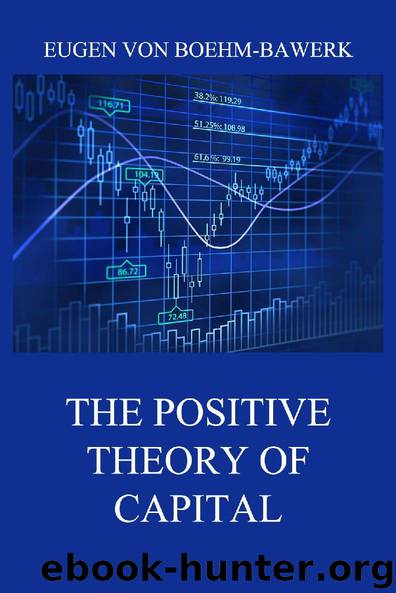The Positive Theory of Capital by Eugen von Boehm-Bawerk

Author:Eugen von Boehm-Bawerk [Boehm-Bawerk, Eugen von]
Language: eng
Format: epub
Tags: Wirtschaft
Publisher: Jazzybee Verlag
Published: 2017-07-26T22:00:00+00:00
Book V, Chapter II: Differences in Want and Provision for Want
The first great cause of difference in value between present and future goods consists in the different circumstances of want and provision (Bedarf und Deckung) in present and future. Present goods, as we know, receive their value from the circumstances of want and provision in the present: future goods from the same circumstances in those future periods of time when they will come into our disposal. If a person is badly in want of certain goods, or of goods in general, while he has reason to hope that, at a future period, he will be better off, he will always value a given quantity of immediately available goods at a higher figure than the same quantity of future goods. In economic life this occurs very frequently, and may be considered as typical in the two following cases. First, in all cases of immediate distress and necessity. A peasant who has had a bad harvest, or sustained loss by fire, an artisan who has had heavy expenses through illness or death in his family, a labourer who is starving; all these agree in valuing the present shilling, which lifts them out of direst need, ever so much more than the future shilling,—the proof being the usurious conditions to which such people often submit in order to raise money at the moment. Ref. 195 Second, in the case of persons who have reason to look forward to economical circumstances of increasing comfort. Thus all kinds of beginners who have no means, such as young artists, lawyers, officials, budding doctors, men going into business, are only too ready, in return for a sum of present goods which assists them to start in the vocation they have chosen, and acts as foundation of their economical existence, to promise a considerably larger sum on the condition that they do not require to pay it until they are in receipt of a decent income. Ref. 196
Of course the contrary also occurs not unfrequently in economical life. There are persons who are comparatively well off at the moment, and who are likely to be worse off in the future. To this category belongs, among others, that very considerable number of people whose income is obtained, mostly or altogether, by personal exertions, and will, presumably, fall away at a later period of life when they become unfit for work. A merchant's clerk, for instance, who is in his fiftieth year, and has an income of £100, cannot expect to have anything better ten years later than, perhaps, a small retiring allowance of £30, or an annuity which he may secure by purchase at an assurance office. It is evident that to such people the marginal utility that depends on a shilling spent now is smaller than that depending on a shilling available in the more badly secured future. It would seem that, in such cases, a present shilling should be less valued than a future one. And so it would be if present goods were necessarily spent in the present, but that is not the case.
Download
This site does not store any files on its server. We only index and link to content provided by other sites. Please contact the content providers to delete copyright contents if any and email us, we'll remove relevant links or contents immediately.
The Deficit Myth by Stephanie Kelton(1112)
Reimagining Capitalism in a World on Fire by Rebecca Henderson(928)
What the Dog Saw: And Other Adventures by Malcolm Gladwell(918)
Karl Polanyi by Gareth Dale(876)
The Logic of Life by Tim Harford(804)
The Capital by Karl Marx(794)
The Essential Adam Smith by Smith Adam(724)
Freakonomics: A Rogue Economist Explores the Hidden Side of Everything by Levitt Steven D(650)
One Flew Over the Cuckoo's Nest by Ken Kesey(640)
An Essay on the Principle of Population by T. R. Malthus(598)
The Mythology of Work by Peter Fleming(595)
The Outline of Sanity by G. K. Chesterton(579)
Freakonomics: A Rogue Economist Explores the Hidden Side of Everything by Steven D. Levitt; Stephen J. Dubner(565)
The Worldly Philosophers by Robert L. Heilbroner(532)
The Marginal Revolutionaries by Janek Wasserman(531)
On the Principles of Political Economy and Taxation (Economics books Book 11) by Ricardo David(525)
The Idea of Justice by Amartya Sen(515)
Cold Intimacies: The Making of Emotional Capitalism by Eva Illouz(483)
The AI Economy by Roger Bootle(481)
